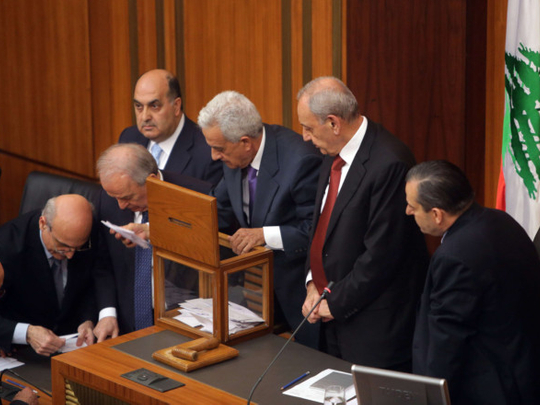
Beirut: In the end, while 124 of the 128 members of parliament were present in the chamber, Lebanese deputies failed to elect a new president with the required two-thirds majority on the first round.
Four deputies were no shows yesterday: Sa’ad Hariri (Sunni), Oqab Saqr (Shiite), Elie Aoun (Maronite Catholic) and Khalid Al Daher (Sunni).
When the votes were counted, the tally stood at Lebanese Forces leader Samir Geagea with 48 votes, the Progressive Socialist Party (PSP) deputy Henri Helou with 16 votes, Phalangist Party Chief and former president of the republic Ameen Gemayel with 1 vote, while 52 parliamentarians cast blank ballots. Seven voted for dead Lebanese personalities like Dany Chamoun or Rashid Karami.
Although Lebanese lawmakers seldom fulfilled their constitutional duties to legislate — given rare agreements to reach a quorum on any number of topics that effectively meant parliament was idle for most of the year — nearly all were present yesterday to elect a new president.
Still, what this latest failure illustrated was the consequence of the ongoing rivalry between the March 8 and 14 alliances, whose existential disputes over the very identity of the State and how it should be governed surfaced with gusto.
Geagea was expected to receive nearly 60 votes after he secured the official backing of the March 14 alliance, the Phalangist and several independents, though it was clear that several failed to cast their votes in his favour.
Even without the three absent parliamentarians that could have voted for him, he should have received at least 57 votes had his own March 14 alliance voted unanimously.
In the event, and besides the single vote for Ameen Gemayel, what derailed the Geagea candidacy was the surprise Henri Helou nomination, 24 hours before election day. With his 16 votes, Henri Helou, a Maronite deputy from Aley representing Walid Jumblatt’s Progressive Socialist Party, proved to be the vital swing aspirant that derailed the Geagea nomination and it remained to be determined whether he may make the necessary adjustments to collect 49 additional votes to win next Wednesday.
What the Helou contention highlighted, nevertheless, was the critically disruptive role that Walid Jumblatt played in Lebanese politics, telegraphing out loud that the PSP was uniquely situated to determine who could become the next head of state. Jumblatt, a self-appointed centrist who conveniently switched sides before and after the Syrian withdrawal from Lebanon in 2005, claimed that Helou was a “voice of moderation” even if no one mentioned him seriously 24 hours ago.
Ironically, Helou did not personally announce his candidacy, an honour left to his party boss — Jumblatt. Far fewer surprises arose within the March 8 alliance during this first vote for the 2014 presidential elections, as nearly all of its members cast votes against Geagea rather than for their own candidate.
Observers expected between 56 and 58 blank votes, though only 52 opted for the privilege, since a few probably channeled their protest votes to Helou.
Led by General Michel Aoun, the March 8 coalition insisted that it sought a consensus president, even if Aoun was not that personality — at least for a vast majority of the Lebanese population.
Remarkably, and to prevent the Speaker from calling for a second vote immediately after the 124 ballots were counted and the results announced, a large number of March 8 deputies left the chamber precisely to guarantee the lack of a quorum.
That was the reason why the Speaker scheduled a follow-up session for next Wednesday. Though he failed to garner the magical two-thirds majority required to win the presidency, Samir Geagea secured 48 votes, 32 more than Henri Helou and 47 more than Ameen Gemayel. He was 17 votes short to win next Wednesday and may not be able to reach the number 65.
Others faced similar dilemmas and, in absence of a prior deal, it was unclear whether a quorum of 86 deputies could actually be guaranteed before the Speaker authorised his assistants to start the voting process. That meant that all sides were poised to engage in intensive lobbying — with immense personal and financial commitments — along with regional and international pressures.












